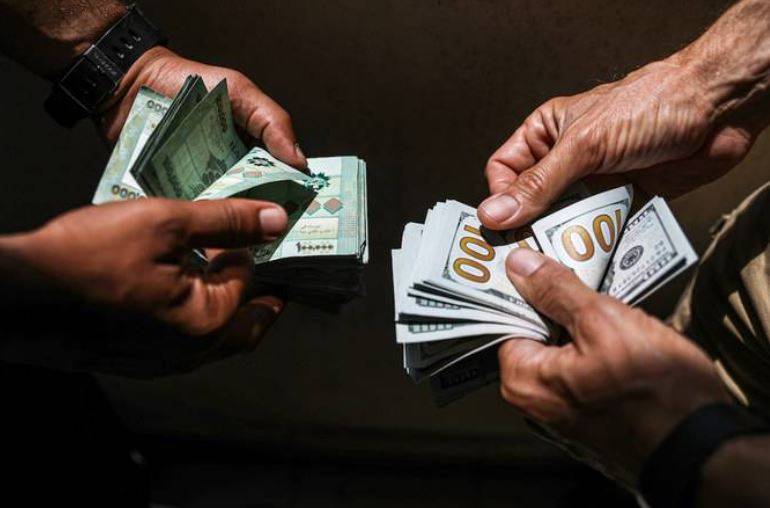
People exchange Lebanese pound and US dollar notes on the black market in Lebanon’s capital Beirut on June 18, 2020. (Credit: AFP)
BEIRUT — While confusion has swirled over the refusal of some money exchangers to accept old 100 US dollar banknotes, figures in Lebanon’s financial sector insisted to L’Orient Today that the bills should be considered valid, even if some are not taking them.
Lebanese have taken to social media in recent days to voice their frustration that money exchangers were balking at accepting the bills and in some cases offering to buy the banknotes, which lack the latest counterfeiting countermeasures, at a discount. Such practices lack legal grounding, according to Lebanon’s central bank.
Starting in 2013, the US introduced a new 100 dollar bill, informally known as the “Blue Dollar” in the Lebanese market, which features a blue 3D ribbon woven into the center of the note as opposed to the older note known as the “White Dollar.”When reached by L’Orient Today, a Banque du Liban spokesperson noted that old bills are legal tender in Lebanon, adding that the central bank, private banks and money exchangers lack the prerogatives to make determinations on which US printed banknotes are legal or not.
A manager at Societe Boghos, a firm engaged in the exchange business, said that the cause of the confusion is that some banks are not accepting old notes, a policy reflected in the preferences of consumers who do not want to accept pre-2013 100 dollar notes.
Mario Boghos added that his company as a wholesale banknote trading firm was accepting old 100 US dollar notes, which it then exchanged for newer ones sourced from Gulf states to satisfy demand in Lebanon.
As for currency exchangers who accept the old “white bills” at a fraction of the price or take a commission on them, he said that these exchangers were not licensed and that any such incident should be reported to BDL.
A source at BlomBank, who spoke on condition of anonymity, said that clients could deposit old notes through the bank’s ATMs or over the counter, but if they wanted to exchange an old bill for a new one on the spot, the bank would not honor their request.
The source clarified further that while BlomBank would accept deposits for 100 US dollar notes printed as far back as to the 2006 series, the financial institution would not accept older ones.
A spokesperson for BlomBank said afterward in a statement that the bank is "dealing with both the old and new bill alike."
Meanwhile, a Bank Audi source also said that the bank was “dealing with old and new bills alike.”
In a statement to L’Orient Today, the US Embassy in Lebanon said that “it is US government policy that all designs of Federal Reserve notes remain legal tender, or legally valid for payments, regardless of when they were issued. This policy includes all denominations of Federal Reserve notes, from 1914 to present.”
The spokesperson also referred anyone confused over the authenticity of older notes to consult the followng US Federal Reserve-managed website.
Update: This article has been updated with an official statement from BlomBank.